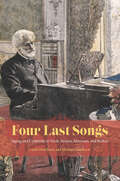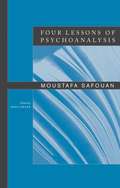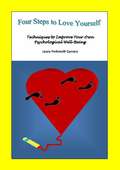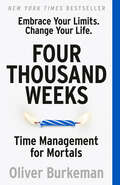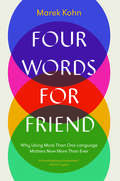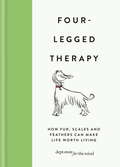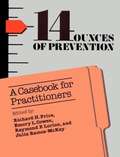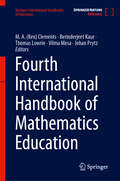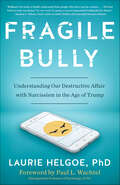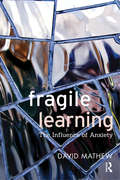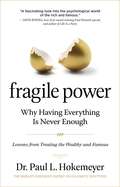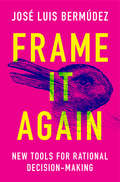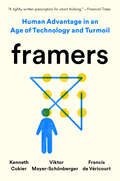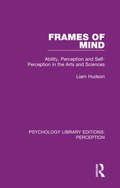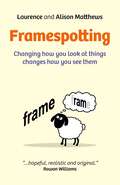- Table View
- List View
Four Last Songs: Aging and Creativity in Verdi, Strauss, Messiaen, and Britten
by Linda Hutcheon Michael HutcheonAging and creativity can seem a particularly fraught relationship for artists, who often face age-related difficulties as their audience s expectations are at a peak. In"Four Last Songs," Linda and Michael Hutcheon explore this issue via the late works of some of the world s greatest composers. Giuseppe Verdi (1813 1901), Richard Strauss (1864 1949), Olivier Messiaen (1908 92), and Benjamin Britten (1913 76) all wrote operas late in life, pieces that reveal unique responses to the challenges of growing older. Verdi s"Falstaff," his only comedic success, combated Richard Wagner s influence by introducing young Italian composers to a new model of national music. Strauss, on the other hand, struggling with personal and political problems in Nazi Germany, composed the self-reflexive"Capriccio," a life review of opera and his own legacy. Though it exhausted him physically and emotionally, Messiaen at the age of seventy-five finishedhis only opera, "Saint Francois d Assise," which marked the pinnacle of his career. Britten, meanwhile, suffering from heart problems, refused surgery until he had completed his masterpiece, "Death in Venice. " For all four composers, age, far from sapping their creative power, provided impetus for some of their best accomplishments. With its deft treatment of these composers final years and works, "Four Last Songs" provides a valuable look at the challenges and opportunities that present themselves as artists grow older. "
Four Lessons of Psychoanalysis
by Moustafa SafouanIn this delightfully readable and clearly written volume, the world renowned psychoanalyst Moustafa Safouan considers the works of Freud and Lacan. When Safouan met Lacan in 1949, he was all but ready to abandon the field due to the many contradictions and obscurities he found in Freud. Yet thanks to Lacan's early presentation of the father as real, imaginary, and symbolic, Safouan stayed on, working with Lacan until Lacan?s death in 1981. One can track the evolution of Safouan's teaching through his participation in Lacan's published seminars and his early contributions. Safouan wrote this book in English, starting with a transcript from a series of lectures he delivered to the Lacanian School of Psychoanalysis in San Francisco, in March of 2001. Safouan clears up many of Lacan's own obscurities, although he is quick to point out that there are no contradictions in Lacan.Readers will find the cause of desire, both through the signifier and through the 'normative' (rather than normal) development of the child. Safouan explains the three forms of lack, the root of subjectivity, the desire of the analyst, the Other as different from the other, the object cause of desire, transference, countertransference and lateral transference, and the analytic act in a narrative that brings these and other concepts together, in a 'dictionary' that could never be divided by terms.
Four Novels in Jung’s 1925 Seminar: Literary Discussion and Analytical Psychology
by Matthew A FikeC. G. Jung believed that popular fiction often conveyed unvarnished psychological truths. In this volume, Matthew A. Fike skillfully analyzes the novels under consideration in Jung’s 1925 seminar on analytical psychology, corrects Jung’s ill-informed perspectives, and sheds light on a neglected area of Jungian literary studies. Jung originally planned to discuss several novels about the anima—Henry Rider Haggard’s She, Pierre Benoît’s L’Atlantide, and Gustav Meyrink’s The Green Face. At the request of his participants, he dropped Meyrink and included a text about the animus, Marie Hay’s The Evil Vineyard. Fike demonstrates that Haggard’s She and Benoît’s L’Atlantide portray anima possession, the visionary and psychological modes, and traditional versus Jungian approaches to history. Meyrink’s smorgasbord of Jungian theory and religion makes The Green Face a fictional counterpart to The Red Book, and both Meyrink and Hay depict states of higher consciousness that transcend the archetypes. The distinction between archetypal and spiritual possession demonstrates that The Evil Vineyard is a ghost story, and the study concludes with Hay’s dozens of allusions, which provide important metacommentary. Four Novels in Jung’s 1925 Seminar, the first comprehensive study of all four texts, complements seminal works by Cornelia Brunner and Barbara Hannah, critiques the seminar discussion recorded in William McGuire’s edition of Analytical Psychology: Notes of the Seminar Given in 1925 by C. G. Jung, and incorporates Jung’s own comments on the four novels in The Collected Works. Thus, it provides an essential addition to Jungian literary studies and will appeal both to students and practitioners of Jungian analytical psychology and to scholars of British, French, and German literature.
Four Steps to Love Yourself. Techniques to Improve Your Own Psychological Well-Being
by Mihaiela Corsatea Laura Pedrinelli CarraraHandbook of psychological exercises to improve your self-knowledgde The book was intended to improve the psychological well-being with oneself, while putting an emphasis on oneself and improving the relationships with oneself and the others. It helps the participant reader because apart from reading, he or she will have to give their own contribution throughout a psychological and physical process, in order to improve their own emotional harmony. It refers to security, self-esteem, the relationship with the others and confronting stressful situations. The exercises are structured on four chapters, called “STEPS”, because they lead the person throughout a psychological, physical and creative journey, which helps the participant reader to better get in touch with oneself, to know more about him/her psychologically, manage to express parts of themselves and understand how to manage difficult situations.
Four Thousand Weeks: Time Management for Mortals
by Oliver Burkeman&“This is the most important book ever written about time management. Oliver Burkeman offers a searing indictment of productivity hacking and profound insights on how to make the best use of our scarcest, most precious resource. His writing will challenge you to rethink many of your beliefs about getting things done-and you&’ll be wiser because of it.&” -Adam Grant, #1 New York Times bestselling author of Think Again and host of WorkLife Time is our biggest worry: there is too little of it. The award-winning, renowned Guardian columnist Oliver Burkeman offers a lively, entertaining philosophical guide to time and time management, setting aside superficial efficiency solutions in favour of reckoning with and finding joy in the finitude of human life.The average human lifespan is absurdly, insultingly brief. Assuming you live to be eighty, you have just over four thousand weeks.Nobody needs telling there isn't enough time. We're obsessed with our lengthening to-do lists, our overfilled inboxes, work-life balance, and the ceaseless struggle against distraction; and we're deluged with advice on becoming more productive and efficient, plus "lifehacks" to optimize our days. But such techniques often just end up making things worse. The sense of anxious hurry grows more intense, and still the most meaningful parts of life seem to lie just beyond the horizon. Still, we rarely make the connection between our daily struggles with time and the ultimate time management problem: the challenge of how best to use our four thousand weeks.Drawing on the insights of ancient and contemporary philosophers, psychologists, and spiritual teachers, Oliver Burkeman delivers an entertaining, humorous, practical, and ultimately profound guide to time and time management. Rejecting the futile modern obsession with "getting everything done," he introduces readers to tools for constructing a meaningful life, showing how many of the unhelpful ways we've come to think about time aren't inescapable, unchanging truths, but choices we've made, as individuals and as a society--and that we could do things differently.
Four Ways to Click
by Leigh Ann Hirschman Daniel J. Siegel Amy BanksResearch shows that people cannot reach their full potential unless they are in healthy connection with others. Dr. Amy Banks teaches us how to rewire our brains for healthier relationships and happier, more fulfilling lives.We all experience moments when we feel isolated and alone. A 2006 Purdue University study found that twenty-five percent of Americans cannot name a single person they feel close to. Yet every single one of us is hardwired for close relationships. The key to more satisfying relationships--be it with a significant other, family member, or colleague--is to strengthen the neural pathways in our brains that encourage closeness and connection.There are four distinct neural pathways that correspond to the four most important ingredients for healthy and satisfying relationships: calmness, acceptance, emotional resonance, and energy. This groundbreaking book gives readers the tools they need to strengthen the parts of their brain that encourage connection and to heal the neural damage that disconnection can cause.
Four Ways to Click
by Leigh Ann Hirschman Daniel J. Siegel Amy BanksResearch shows that people cannot reach their full potential unless they are in healthy connection with others. Dr. Amy Banks teaches us how to rewire our brains for healthier relationships and happier, more fulfilling lives. We all experience moments when we feel isolated and alone. A 2006 Purdue University study found that twenty-five percent of Americans cannot name a single person they feel close to. Yet every single one of us is hardwired for close relationships. The key to more satisfying relationships--be it with a significant other, a family member, or a colleague--is to strengthen the neural pathways in our brains that encourage closeness and connection. In this groundbreaking book, Dr. Banks give us a road map for developing the four distinct neural pathways in the brain that underlie the four most important ingredients for close relationships: calmness, acceptance, emotional resonance, and energy. Four Ways to Click gives you the tools you need to strengthen the parts of your brain that encourage connection and to heal the neural damage that disconnection can cause.From the Hardcover edition.
Four Words for Friend: Why Using More Than One Language Matters Now More Than Ever
by Marek KohnA compelling argument about the importance of using more than one language in today’s world In a world that has English as its global language and rapidly advancing translation technology, it’s easy to assume that the need to use more than one language will diminish—but Marek Kohn argues that plural language use is more important than ever. In a divided world, it helps us to understand ourselves and others better, to live together better, and to make the most of our various cultures. Kohn, whom the Guardian has called “one of the best science writers we have,” brings together perspectives from psychology, evolutionary thought, politics, literature, and everyday experience. He explores how people acquire languages; how they lose them; how they can regain them; how different languages may affect people’s perceptions, their senses of self, and their relationships with each other; and how to resolve the fundamental contradiction of languages, that they exist as much to prevent communication as to make it happen.
Four-Legged Therapy: How fur, scales and feathers can make life worth living
by Department Store for the MindA WORDLESS LISTENER, A REASON TO GO OUTSIDE, AN INTENSE SURGE OF JOY...What healthy habits can we learn from our fluffy, scaly and, let's face it, stinky companions? Is it just the companionship and love or is there more to it?Discover the myriad ways in which our pets and other animals can help us feel more present and connected in our lives, how they literally save lives and also make life more worth living. From the 'hensioners' who look after ex-battery chickens to 'goat club', dogs who listen to children learning to read and Mitzpah the collie who just knows how to make people smile. There is a world of therapy out there, waiting to sit on your lap.
Four-Legged Therapy: How fur, scales and feathers can make life worth living
by Dept LtdFour- Legged Therapy is a delightfully illustrated collection of ten stories that recognise the therapeutic value of having animals in our lives. A charming exploration of how pets can support our minds and bodies in everyday life. From grumpy cats, fat dogs and muddy ducks to goats in a classroom and rescue-hens in a care home, this book recognises animals as the unsung heroes that save lives and make life worth living. Animals offer companionship, love and fun. They teach us the gift of kindness and acceptance. They can connect us to the world, slow down time and sharpen our senses in a kind of informal meditation. They can be good listeners, offering reassurance and devotion that steadies our self-esteem. They ask us for routine and consistency, to show a kind of resilience that is good for us."Your dog's utter faith in your humanity will make you feel like more and more of a human, every day"- Caroline O'Donoghue, author of 'Promising Young Women', shortlisted for the Irish Book Awards writing about the joy of unconditional from her Jack-Russell terrier, Sylvie. "I feel as if I've been permitted a glimpse into the wonder at the very heart of life, led there by my dog" - Rabbi Jonathan Wittenberg, author of Things My Dog Has Taught Me: About being a better human.
Fourteen Ounces of Prevention: A Casebook for Practitioners
by Richard H. Price<p>Although a growing number of psychologists agree that a wide range of psychological and health problems are preventable, the logic of prevention must be turned into concrete reality. To do that, we must identify model programs that work. . . . This idea led to the American Psychological Association's (APA) Task Force on Prevention, Promotion, and Intervention Alternatives in Psychology to launch a major effort to search for effective model prevention programs. <p>This book represents the end product of the Task Force's efforts. We proposed a uniform structure in which all authors begin with a brief discussion of the program's issues, problems, and goals; describe how the program actually works; discuss briefly the research evidence for program effectiveness; highlight the program's limitations as well as positive aspects; and offer practical suggestions for starting a new program. </p>
Fourth International Handbook of Mathematics Education (Springer International Handbooks of Education)
by M. A. Ken Clements Berinderjeet Kaur Thomas Lowrie Vilma Mesa Johan PrytzThis fourth international handbook discusses developments not recognized or dealt with fully in the first three Springer Mathematics Education handbooks and tackles controversial issues in the field. After starting with a provocative introductory chapter which asks whether controversy is a healthy feature of international mathematics education, the four following sections cover: (a) mathematics education in Asia; (b) the roles of theory in research and practice; (c) equity and social justice; and (d) curriculum and change. These themes are taken up in 28 chapters by 60 authoritative authors from all continents. Each of the four sections is structured on the basis of past, present, and future aspects. Like the first three mathematics education handbooks, this handbook provides a very valuable resource for teachers, mathematics education practitioners and researchers, education policy makers, and mathematicians, as well as graduate and undergraduate students.
Fragestrategien als Führungsinstrument in der Familienmediation (essentials)
by Thomas SpörerFragestrategien haben für die Gesprächsführung in Mediationsverfahren inhaltlich und führungstechnisch eine zentrale Funktion. Dennoch spielen sie in den meisten Ausbildungsgängen zum Mediator/zur Mediatorin keine hervorgehobene Rolle. Dieser Band thematisiert u.a. eine beobachtbare allgemeine Unsicherheit bei Mediatoren bezüglich der systematischen Anwendung und Gestaltung von Fragestrategien.Er erläutert dabei exemplarisch anhand eines idealtypischen Mediationsverlaufs für Paare Schritt für Schritt die fragegestützte Gestaltung und Entwicklung solcher Einigungsprozesse und unterstreicht den damit entstehenden Nutzen eines solchen Weges nicht nur für die Betroffenen, sondern auch für die Mediatoren selbst.
Fragile Bully: Understanding Our Destructive Affair with Narcissism in the Age of Trump
by Laurie HelgoeObsessive self-promotion, an aggressive triggering response, and retaliatory rants. “Both sensitive and incisive, beautifully capturing the paradoxical dynamic of narcissism—that the grandiosity and surrounding bravado belies an underlying fragility and brittleness.” —Kenneth N. Levy, PhD, Associate Professor, Penn State University; Senior Fellow, Personality Disorders Institute, Cornell University Even before Donald Trump entered America’s highest office, an international survey revealed that narcissism is part of the assumed “national character” of Americans. While only a small number actually meet the criteria for Narcissistic Personality Disorder, those exploitive few have a way of gaining center stage in our culture.Fragile Bully: Understanding Our Destructive Affair With Narcissism in the Age of Trump looks beyond the sound bites of self-aggrandizing celebrities and selfish tweets to the real problem of narcissism. We see past the solo act to the vicious circles that arise in relationships with a fragile bully, and how patterns like this generate both power and self-destruction. We also look at the problem of Echo, how so many of us get hooked by the narcissist, and how variations on the destructive affair leave both partners dehumanized and diminished. Once we recognize the steps in each dance, we can break the cycle and allow and the possibility of true engagement.
Fragile Learning: The Influence of Anxiety
by David MathewWhat are the barriers and obstacles to adults learning? What makes the process of adult learning so fragile? And what exactly do we mean by Fragile Learning? This book addresses these questions in two ways. In Part One, it looks at challenges to learning, examining issues such as language invention in a maximum security prison, geography and bad technology, and pedagogic fragility in Higher Education. Through a psychoanalytic lens, Fragile Learning examines authorial illness and the process of slow recovery as a tool for reflective learning, and explores ethical issues in problem-based learning. The second part of the book deals specifically with the problem of online anxiety. From cyberbullying to Internet boredom, the book asks what the implications for educational design in our contemporary world might be. It compares education programmes that insist on the Internet and those that completely ban it, while exploring conflict, virtual weapons and the role of the online personal tutor.
Fragile Like Us
by Sara BarnardIn the tradition of Sarah Dessen and Morgan Matson comes a pitch perfect novel about friendship and what it takes to break the bonds between friends.Caddy and Rosie have always been inseparable. But that was before Suzanne. Now the twosome has become a triangle with constantly shifting alliances. Caddy’s ready to be more than just the quiet one. She wants something to happen. Suzanne is trying to escape her past and be someone different, someone free. But sometimes downward spirals have a momentum of their own. And no one can break your heart like a best friend.
Fragile Power: Why Having Everything Is Never Enough; Lessons from Treating the Wealthy and Famous
by Dr. Paul L. HokemeyerA revealing exploration of people whose wealth, fame, beauty, and social status grant them immense power. Celebrity culture drives us to aspire to be like the few who seem to have figured out how to have it all. But is it possible that they simultaneously have everything and nothing at all?Having treated some of the world’s most successful people, psychotherapist “Dr. Paul” sets out to answer why so many people who have everything end up feeling like their achievements are never enough—as well as what that pattern can reveal about ourselves and the society in which we live. The exclusivity of living behind the velvet rope or the gilded gate doesn’t guarantee happiness for the rich, famous, and powerful; there are downsides to attainment as well. We all—including people who seem protected by their privileged lives—can experience the self-destructive behaviors common to modern life, including chronic stress, addiction, anxiety, imposter syndrome, infidelity, negative body image, and narcissism. Division marks our era. There’s a growing separation between the haves and have nots, men and women, as well as the empowered and the disenfranchised. At the same time, our culture is defined by celebrities, and the powerful, affluent people we put on a pedestal to idolize and emulate. Too often, we think our lives would be better if we could have what they have or be more like them. It’s time to realize that even the most admired people can go through life feeling unloved and unable to escape their problems. From the therapist’s chair, we learn how feelings of shame, insecurity, abandonment, and emotional pain are all part of the human condition. With empathy, we can overcome our sense of isolation by realizing that we all crave—and deserve—understanding, intimacy, and real connection.
Fragmente einer Sprache des Essens
by Christoph KlotterDer vorliegende Band beschäftigt sich zum einen mit der Reduktion des Essens auf eine naturwissenschaftliche Perspektive und moralisches Gebot und hebt zum anderen die kulturelle und soziale Bedeutung hervor. Seit der Entstehung der Ernährungswissenschaft Mitte des 19. Jahrhunderts haben wir uns daran gewöhnt, von Vitaminen, Proteinen und Kohlehydraten zu sprechen. Wir betrachten Lebensmittel aus naturwissenschaftlicher Sicht, lösen sie in einzelne Bestandteile auf und quantifizieren diese, um festzustellen, wie viel wir von welchem Inhaltsstoff zu uns nehmen müssen, um uns gesund zu ernähren. Die Ernährung hat dann die primäre Aufgabe, die Gesundheit zu erhalten und das Leben zu verlängern. Wer sich dieser Aufgabe verweigert, wie vermeintlich die Adipösen, darf moralisch verurteilt werden. Ernährung und Gesundheit haben sich so moralisiert. Somit wird mittels der empfohlenen Ernährung ein zentraler abendländischer Wert vermittelt, der der Mäßigung. Von Platon bis zur protestantischen Ethik, die unser Leben heute bestimmt, wird Mäßigung eingefordert, heute über das rigide Schlankheitsideal.
Frame It Again: New Tools for Rational Decision-Making
by José Luis BermúdezFraming effects are everywhere. An estate tax looks very different to a death tax. Gun safety seems to be one thing and gun control another. Yet, the consensus from decision theorists, finance professionals, psychologists, and economists is that frame-dependence is completely irrational. This book challenges that view. Some of the toughest decisions we face are just clashes between different frames. It is perfectly rational to value the same thing differently in two different frames, even when the decision-maker knows that these are really two sides of the same coin. Frame It Again sheds new light on the structure of moral predicaments, the nature of self-control, and the rationality of co-operation. Framing is a powerful tool for redirecting public discussions about some of the most polarizing contemporary issues, such as gun control, abortion, and climate change. Learn effective problem-solving and decision-making to get the better of difficult dilemmas.
Framed by Gender: How Gender Inequality Persists in the Modern World
by Cecilia L. RidgewayIn an advanced society like the U.S., where an array of processes work against gender inequality, how does this inequality persist? Integrating research from sociology, social cognition and psychology, and organizational behavior, Framed by Gender identifies the general processes through which gender as a principle of inequality rewrites itself into new forms of social and economic organization. Cecilia Ridgeway argues that people confront uncertain circumstances with gender beliefs that are more traditional than those circumstances. They implicitly draw on the too-convenient cultural frame of gender to help organize new ways of doing things, thereby re-inscribing trailing gender stereotypes into the new activities, procedures, and forms of organization. This dynamic does not make equality unattainable, but suggests a constant struggle with uneven results. Demonstrating how personal interactions translate into larger structures of inequality, Framed by Gender is a powerful and original take on the troubling endurance of gender inequality.
Framers: Human Advantage in an Age of Technology and Turmoil
by Viktor Mayer-Schönberger Kenneth Cukier Francis de VéricourtThe essential tool that will enable humanity to find the best way through a forest of looming problems is defined in Framers by internationally renowned authors Kenneth Cukier, Viktor Mayer-Schönberger and Francis de Véricourt. From pandemics to populism, AI to ISIS, wealth inequity to climate change, humanity faces unprecedented challenges that threaten our very existence. To frame is to make a mental model that enables us to see patterns, predict how things will unfold, and make sense of new situations. Frames guide the decisions we make and the results we attain. People have long focused on traits like memory and reasoning leaving framing all but ignored. But with computers becoming better at some of those cognitive tasks, framing stands out as a critical function—and only humans can do it. This book is the first guide to mastering this innate human ability. Illustrating their case with compelling examples and the latest research, authors Cukier, Mayer-Schönberger and de Véricourt examine: · Why advice to &“think outside the box&” is useless. · How Spotify beat Apple by reframing music as an experience. · What the historic 1976 Israeli commando raid on Entebbe that rescued over 100 hostages can tell us about how to frame. · How the #MeToo twitter hashtag reframed the perception of sexual assault. · The disaster of framing Covid-19 as equivalent to seasonal flu, and how framing it akin to SARS delivered New Zealand from the pandemic. Framers shows how framing is not just a way to improve how we make decisions in the era of algorithms—but why it will be a matter of survival for humanity in a time of societal upheaval and machine prosperity.
Frames Of Mind: A Rhetorical Reader With Occasions For Writing
by Robert DiYanni Pat C. HoyThe first full-color rhetorical reader with an integrated CD-ROM, FRAMES OF MIND: A RHETORICAL READER WITH OCCASIONS FOR WRITING treats the traditional rhetorical patterns not only as methods for effective writing, but as frames for critical thinking.
Frames of Memory after 9/11
by Lucy BondFrames of Memory makes an important intervention into the emerging body of scholarship surrounding the culture and politics of the post-9/11 world. Bond provides a sweeping analysis of American memorial culture after 11 September, examining the ways in which diverse modes of commemoration, from Acts of Congress to museum exhibits, the military commissions at Guantanamo Bay to the corpus of 9/11 trauma fiction, have adhered to delimiting templates of remembrance that present an artificial impression of a unified American response to the attacks. In so doing, the book poses a series of urgent questions about the ethical and political factors at stake in the work of memory, asking why, and with what consequences, commemoration becomes an ideological endeavour; in what ways the academic discipline of memory studies influences contemporary memorial practice, and vice versa; what it means to seek justice for the dead; and how we might open the exceptionalist and exclusionary culture of memory surrounding 9/11 to a more diverse, globally oriented engagement with the recent past. "
Frames of Mind: Ability, Perception and Self-Perception in the Arts and Sciences (Psychology Library Editions: Perception #14)
by Liam HudsonContrary Imaginations was an original and suggestive study of two types of intelligent schoolboy – the converger with his preference for science and the diverger with his leaning towards the arts. In Frames of Mind, originally published in 1968, Liam Hudson extends and enriches this classification and begins to detect the existence of two subcultures. Within these it is not merely a question of leanings towards science or the arts as a vocation: respect for authority, masculine and feminine tendencies, qualities of perception, and the prevalent myths about various callings are all involved. The result is a very human and well-grounded investigation of the profound forces (whether of social origin or based within their own personalities) which, in varying ways, influence young people in choosing a career.
Framespotting: Changing How You Look At Things Changes How You See Them
by Alison Matthews Laurence MatthewsLook at it this way... Everywhere we look, &“framing&” affects how we see things. Frames restrict our view, keeping us from seeing the whole truth, and subtly influencing our take on everything from deck-chairs to democracy. This upbeat, punchy guide to framespotting will open your eyes and your mind. Learn to notice frames and it&’s amazing what else you&’ll see: fresh ideas; how and why you&’re being hoodwinked; and how you&’re part of the transition from growth to growing up. Framespotting is empowering and liberating. And you&’ll never look at sprinklers or economists the same way again.
